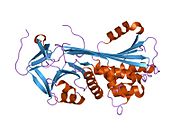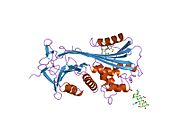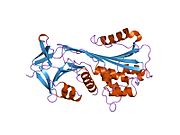Alpha 1-antichymotrypsin
| SERPINA3 | |||
|---|---|---|---|
Gene ontology | |||
| Molecular function | |||
| Cellular component | |||
| Biological process | |||
| Sources:Amigo / QuickGO | |||
Ensembl | |||||||||
|---|---|---|---|---|---|---|---|---|---|
| UniProt | |||||||||
| RefSeq (mRNA) | |||||||||
| RefSeq (protein) | |||||||||
| Location (UCSC) | Chr 14: 94.61 – 94.62 Mb | Chr 12: 104.3 – 104.31 Mb | |||||||
| PubMed search | [3] | [4] | |||||||
| View/Edit Human | View/Edit Mouse |
Alpha 1-antichymotrypsin (symbol α1AC,[5] A1AC, or a1ACT) is an alpha globulin glycoprotein that is a member of the serpin superfamily. In humans, it is encoded by the SERPINA3 gene.
Function
Alpha 1-antichymotrypsin inhibits the activity of certain
lower respiratory tract, from damage caused by proteolytic enzymes.[6]
This protein is produced in the
acute phase protein that is induced during inflammation
.
Clinical significance
Deficiency of this protein has been associated with
Parkinson disease and chronic obstructive pulmonary disease.[7]
Alpha 1-antichymotrypsin is also associated with the pathogenesis of Alzheimer's disease as it enhances the formation of amyloid-fibrils in this disease.[6]
Interactions
Alpha 1-antichymotrypsin has been shown to
See also
- Alpha-1 antitrypsin, another serpin that is analogous for protecting the body from excessive effects of its own inflammatory proteases
References
- ^ a b c GRCh38: Ensembl release 89: ENSG00000196136 – Ensembl, May 2017
- ^ a b c GRCm38: Ensembl release 89: ENSMUSG00000058207 – Ensembl, May 2017
- ^ "Human PubMed Reference:". National Center for Biotechnology Information, U.S. National Library of Medicine.
- ^ "Mouse PubMed Reference:". National Center for Biotechnology Information, U.S. National Library of Medicine.
- ISBN 0-397-54589-4.
- ^ S2CID 11230631.
- ^ "Entrez Gene: SERPINA3 serpin peptidase inhibitor, clade A (alpha-1 antiproteinase, antitrypsin), member 3".
- PMID 14668352.
Further reading
- Janciauskiene S, Wright HT (1999). "Inflammation, antichymotrypsin, and lipid metabolism: autogenic etiology of Alzheimer's disease". BioEssays. 20 (12): 1039–46. PMID 10048303.
- Kalsheker N, Morley S, Morgan K (2002). "Gene regulation of the serine proteinase inhibitors alpha1-antitrypsin and alpha1-antichymotrypsin". Biochem. Soc. Trans. 30 (2): 93–8. PMID 12023832.
External links
- The MEROPS online database for peptidases and their inhibitors: I04.002
- Alpha+1-antichymotrypsin at the U.S. National Library of Medicine Medical Subject Headings (MeSH)
- Human SERPINA3 genome location and SERPINA3 gene details page in the UCSC Genome Browser.
- Overview of all the structural information available in the PDB for UniProt: P01011 (Human Alpha-1-antichymotrypsin) at the PDBe-KB.





